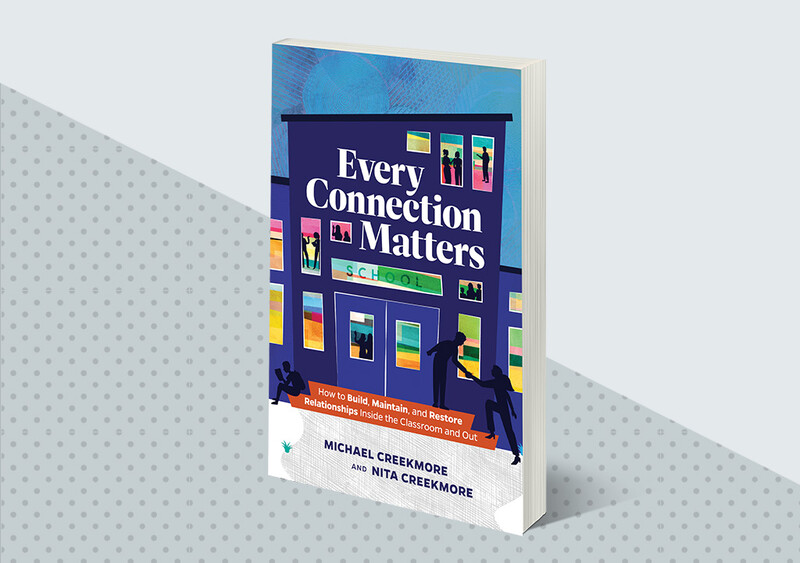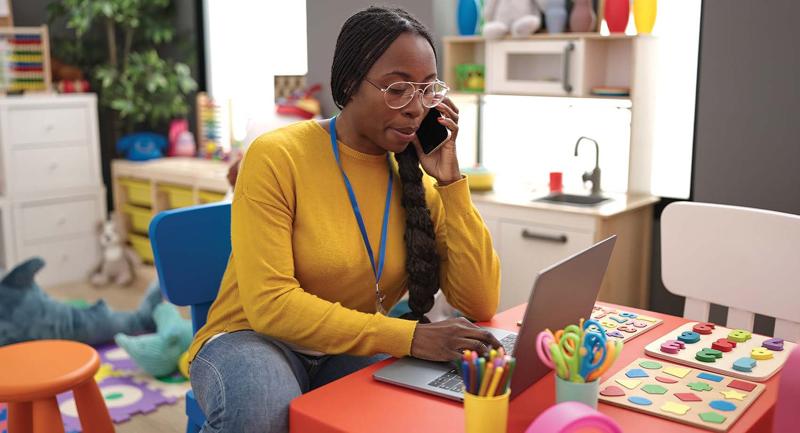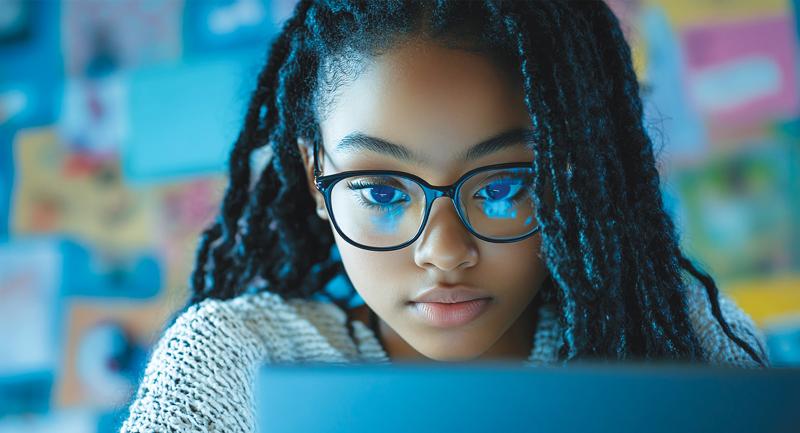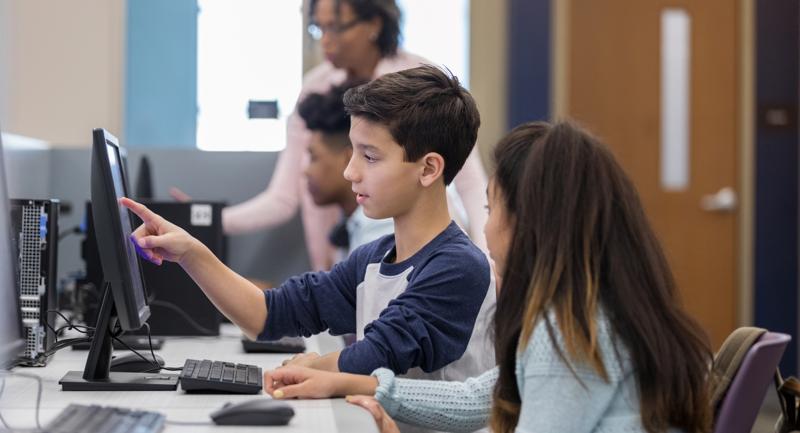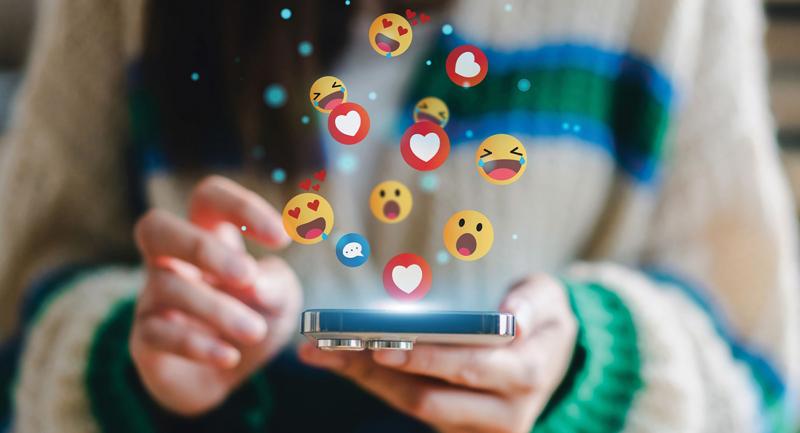Mere moments into the first school day after Thanksgiving break, a student rushed into my office eager to talk. “Mr. Creekmore! Remember when you met with us to talk about how drama can start on social media and follow you IRL?”
Before I could respond, the 5th grader went on to describe a situation that had developed in a months-long group chat with 15 friends. Everything was going well until one friend made a comment about someone’s mother looking like Marge Simpson. The chat went from lighthearted to mean-spirited in a matter of minutes, turning into a heated roasting session. Former friends were now opps, and several students planned to run fades at lunch. News of those anticipated fights began circulating on Instagram, Snapchat, TikTok, and in other group chats; many students were eager for entertainment instead of trying to diffuse the tension.
My first day back as my elementary school’s 4th and 5th grade counselor was going to be a long one. On the bright side, it was nice to know that at least one of my students was paying attention during my lesson on digital drama.
Digital Drama Unpacked
Digital drama encompasses the everyday disagreements that occur when communicating online via social media, texts, group chats, and other digital communication means. Unfortunately, I’ve noticed an uptick in students honing their skills as digital problem starters instead of as digital problem solvers.
I’ve noticed an uptick in students honing their skills as digital problem starters instead of as digital problem solvers.
Although technology provides some level of connection, student dependence on digital spaces has increased as opportunities for healthy real-world communication skills have decreased (Haidt, 2024). Because of this, many students lack the fundamental communication and problem-solving skills they typically develop through face-to-face socialization.
As a school counselor, many of the issues I encounter start outside of school, even for kindergarteners. Socializing in person can already be a challenge, but social media makes even mundane disagreements exponentially complicated. There are mean comments on posts, embarrassing memes of classmates mass-distributed to the entire school, and lots of subs. Problematic TikTok challenges like the One-Chip Challenge (where kids eat an extremely spicy chip with no water) or the Nutmeg Challenge (where kids get a hallucinogenic high from consuming nutmeg) can result in injury or even death (Creekmore, 2022).
In some cases, digital drama can morph into cyberbullying. Data from the Cyberbullying Research Center (Patchin, 2023) reflects a steady rise in student reports of cyberbullying over the last seven years; 26.5 percent of students ages 13 to 17 reported experiencing cyberbullying in 2023. Studies also suggest people are more comfortable engaging in conflict in cyberspaces—a phenomenon called the Online Disinhibition Effect (Chen & Xiao, 2022). It’s a fearless environment where insults are more frequent and tones are more disrespectful. In short, students are less likely to feel remorse in digital spaces and often struggle to work through those situations offline. In a time when students are eager to be entertained, many are tolerant of and curious about social drama as long as it does not include them (Prothero, 2023). They just don’t realize that the longer the drama lasts, the greater effect it has on them. When students continue to be a part of toxic chats and watch friend groups disintegrate, their stress levels increase. I’ve witnessed many students become withdrawn and depressed, and those who were once very social grow increasingly isolated.
Digital drama leads to hurt feelings, decreased self-esteem, damaged friendships, social isolation, and in extreme cases, physical altercations (Anderson & Jiang, 2018). U.S. Surgeon General Dr. Vivek Murthy issued an advisory in 2023 about the effects of social media on students’ mental health, emphasizing the correlation between social media use and overall wellness (U.S. Department of Health and Human Services). These warnings should be of great concern to educators, moving us to think about how we can help our students navigate a new era.
Shaping Digital Problem Solvers
As educators, many of us did not have a cellular device during our elementary, middle, and or even high school years; we’re used to face-to-face disagreements and may be at a loss when trying to help students work through digital drama.
Any student who can recognize the pitfalls of social media is well on their way to navigating tricky communication issues.
Creating a generation of digital problem solvers may sound ambitious given the curiosity and entertainment online drama can provide; however, it is possible. Digital problem solvers develop traits like integrity, empathy, effective communication, social advocacy, active listening, and accountability to diffuse conflict. Ultimately, any student who can recognize the pitfalls of social media is well on their way to navigating tricky communication issues. Let’s discuss four ways educators can assist.
1. Relate to students through stories, even from “pre-internet” times.
No matter how old students are, they love a good story. Bonus points if stories include their teachers. Even though communication looked different before the dawn of the cell phone, anyone can relate to stories about misunderstandings, friendship drama, or other social angst. When you talk to students about sticky situations you’ve experienced, it conveys understanding and normalizes their feelings.
I worked with a friend group of 5th graders who were dealing with fallout from a Snapchat post that had offended some of them. The group took sides; friends struggled to maintain friendships. During a small-group mediation, I shared a personal story about a time I got into a big argument with a friend in middle school. I invited my students to think about how I might have handled the situation better and whether I had made choices that would lead to healing. The problem-solving tactic students recommended—pulling my friend aside to have a direct conversation with him—was the same one they eventually employed to resolve their issue.
In some instances, your “Once upon a time, before the cell phone” story may inadvertently provide a solution to an escalating online conflict. At minimum, it can be a much-needed exhale for students who find themselves entangled in drama.
2. Increase your vocabulary.
Every year brings new online fads and lingo. (See “What the Skibidi?” for a current sampling.) It’s the PD you never knew you needed; the more you know, the more you’re able to diffuse situations. I once had a kindergarten student in my office in tears, screaming “I’m not skibidi toilet!” I couldn’t understand why he was so upset until he explained that the term was from a computer-animated YouTube show that featured toilets with a man’s head inside. Once I knew what the term meant, I could understand why it was something he didn’t want another student to call him, and I could approach the situation from a more informed lens.
By no means am I suggesting that you dedicate your next break to learning all the latest and greatest Gen Z and Gen Alpha lingo. However, it doesn’t hurt to know a few terms to understand what students are discussing in front of you. Knowing this “language” goes a long way to keeping you aware of potential issues.
Students who use catchphrases, acronyms, and slang often have no problem translating their meaning for inquisitive teachers. Or, if you want to broaden your horizons unbeknownst to them, Google is your friend.
3. Incorporate digital drama lessons into counseling and classrooms.
Digital citizenship lessons can highlight proper internet decorum, but they don’t always go deep enough. For example, a generic cyber-safety lesson might explain the danger of online predators and help students avoid internet scams—but it offers students little information on how to resolve disputes in their Instagram comments. Social media and group-chat etiquette should be an entirely separate lesson to help students develop social-emotional skills in this area.
This is where school counselors—who have expertise to diffuse social-emotional situations—can come in. I conduct short, preventative lessons with my elementary students, discussing how virtual spats and pranks have real-life consequences. Specific lessons around social media should teach students how to: (1) interact with others respectfully online (refrain from negative comments, give compliments, or just keep scrolling), (2) de-escalate tense or potentially aggressive situations, (3) ask for help from a trusted adult when a situation has gotten out of control, and (4) take intentional breaks from digital communication and consumption (I often tell my students, “Let the digital world miss you for a few”).
One resource I use is Common Sense Education, which offers a free digital citizenship curriculum by grade level and lesson plans to aid in de-escalation. Lessons emphasize ISTE’s five competencies of a good digital citizen—inclusive, informed, engaged, balanced, and alert (Fingal, 2021). I reserve interventions (including peer mediation), talks with a school resource officer, and parent-information sessions, for any issues we can’t prevent.
The rapid advancement of technology has opened a Pandora’s Box of possibilities for students to navigate.
It might feel uncomfortable at first to allow students to discuss their online issues in the classroom. Depending on the grade level, you risk exposing students to new trends they hadn’t heard before. But chances are, those trends will make it to your classroom eventually (often heard through older siblings), whether you want them to or not. By role-playing scenarios with students through guided lessons, they will be better equipped to navigate what they will encounter.
4. Prepare students to de-escalate situations.
I’ve learned that students don’t always have basic de-escalation skills for tricky social situations. Remember the group chat I mentioned earlier that was spurring talk of fights? Ironically, the issue began offline.
A few students started talking about the different levels they completed in the video game Fortnite. One student called cap when another claimed that they beat the game. In response, that student replied, “I think you’re lowkey hating because you can’t even get to that level.” Students argued in the group chat over who was better at the game; insults flew back and forth (including the one about a student’s mother) until someone said, “On God I’m punching the first one of y’all I see in the face!”
I spent two days conducting peer-mediation groups with students who were in this chat. We talked about how de-escalation skills, including active listening, nonverbal communication, and walking away, can be hard to exhibit on a social media app. Online spaces require teaching students to take time to understand the text they’re reading before they respond (reading comprehension), express how they’re feeling in productive ways (written communication), and recognize internal signs of infuriation or overwhelm (putting your phone down).
Students from the peer-mediation groups shared their perspectives with one another in person and agreed to work toward a peaceful resolution. Although no one walked out of my office holding hands, we prevented a physical fight and restored some friendships. Each group chat participant agreed to put forth effort in de-escalating future drama, and those students were able to finish the year without similar incidents.
Skills for the Future
The rapid advancement of technology has opened a Pandora’s Box of possibilities for students to navigate. Unfortunately, we can’t always protect our students from digital danger or hurt. What we can do is teach them the requisite skills required to resolve drama in an online world where they spend much of their time.
By helping students understand how, when, and why they should de-escalate digital drama, we set the stage to implement long-term problem-solving skills. With increased awareness, targeted resources, and collaborative efforts, educators can be more capable in teaching students to become digital problem solvers.
Reflect & Discuss
➛ How has online communication among students affected your classroom culture?
➛ What problem-solving skills do you use to avoid digital drama? How can you incorporate your experience into advice for students?
➛ In what ways does your school use social media or digital communication for classroom learning? What are two or three rules you can implement to make sure students are engaging safely and productively?
Every Connection Matters
A practical guide to the ins and outs of building, maintaining, and restoring positive and productive relationships in schools.

